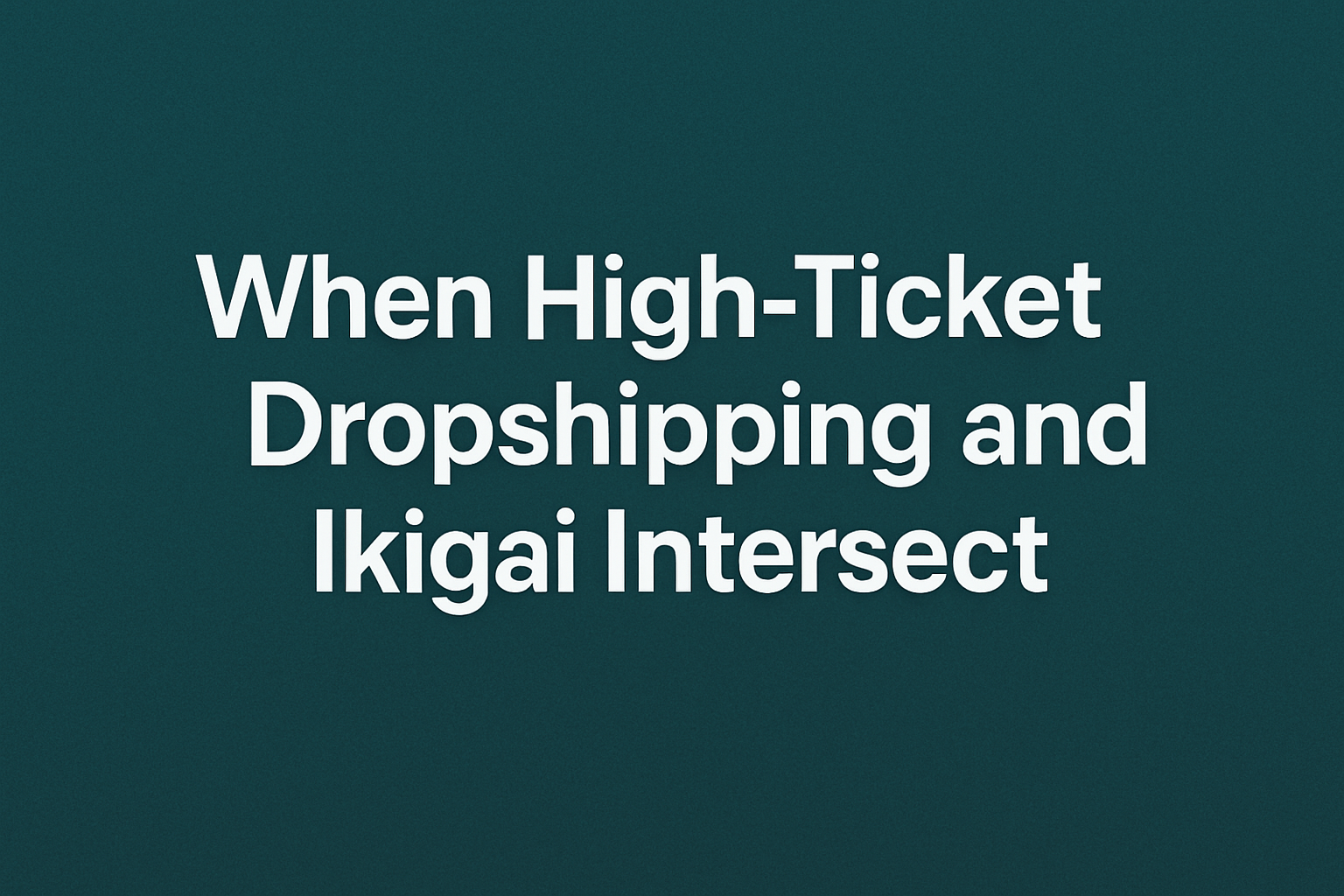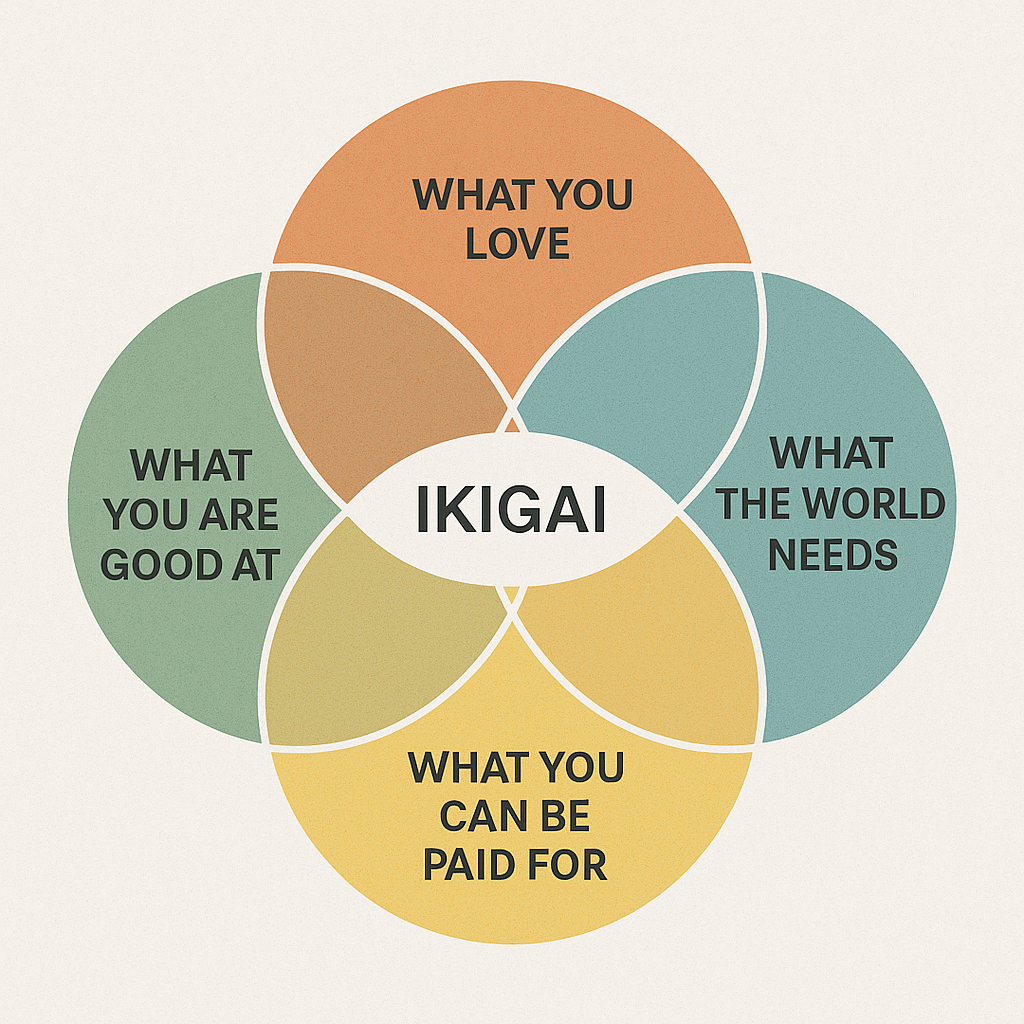

High-ticket dropshipping (HTDS) forces you to stack real entrepreneurial skills—conversion optimization, copywriting, SEO, ads, email, ops, and team building. Those skills compound, travel with you, and often become the bridge to your ikigai—the overlap of what you love, what you’re good at, what the world needs, and what you can be paid for. I’ve coached hundreds of store owners and watched many “graduate” into agencies, brands, consulting, content, and more. I’ve done the same: beyond stores, HTDS led me into coaching, an SEO course I later shut down, and meaningful affiliate income. I recommend Dropship Breakthru as the best on-ramp to build the skill stack quickly and with support—even if your endgame becomes something else.
Most people start a business to make more money or buy back their time. I did too. What kept me in wasn’t the profit, it was the skills and the unexpected doors they opened.
High-ticket dropshipping is a deceptively simple business model. But run it for a few months and you realize it’s a full-stack entrepreneurial training ground. You learn to acquire attention, turn it into trust, and turn trust into revenue,ethically and repeatably. You also learn what you enjoy, what drains you, and what you’re uniquely good at.
That’s where ikigai enters.

Ikigai is the intersection of four circles:
What you love
What you’re good at
What the world needs
What you can be paid for
The catch: when you’re starting out, you don’t know those answers yet, at least not with any precision. You need reps to calibrate. Many entrepreneurs lock into a single lane too early (or chase trends) and end up stuck with a profitable business they don’t like, or a “passion project” that never pays.
HTDS gives you fast, rich feedback across all four circles:
You try many roles quickly (operator, marketer, analyst, negotiator, creator).
You get real customer signals and cash flow to guide decisions.
You develop a portable skill stack that can follow you into any venture later.
When you run an HTDS store well, you touch all the levers that actually move a business:
Conversion Optimization: landing pages, product pages, checkout flow, CRO experiments.
Copywriting: product positioning, offer framing, emails, ads, scripts for sales calls.
SEO: topical mapping, content briefs, link acquisition, internal linking, on-page structure.
Paid Ads: search intent, shopping feeds, retargeting, creative testing, attribution.
Email/SMS: list growth, welcome flows, abandoned cart, post-purchase, campaigns.
Website Performance: speed, UX, schema, accessibility—what actually influences revenue.
Customer Service & Sales: pre-sales questions, objection handling, phone/email closing.
Supplier & Ops: vendor relationships, margins, logistics, SLAs, inventory dynamics.
Systems & Team: SOPs, delegation, hiring/contracting, dashboards, weekly cadences.
This is rare. Most beginner models (print-on-demand, arbitrage, micro-niche blogs) silo you into a couple of skills. HTDS forces breadth and rewards depth, producing a generalist-operator who can later specialize at will.
| Skill mastered in HTDS | Examples in the store | Natural next businesses |
|---|---|---|
| Conversion Optimization | A/B testing PDPs, improving nav & checkout clarity, fixing trust & friction | CRO agency, consulting, in-house growth roles |
| Copywriting | Product positioning, offer framing, email sequences, ad angles | Copy/offer studio, info products, coaching |
| SEO | Topic clusters, on-page structure, internal linking, link outreach | SEO agency, digital PR, media sites |
| Paid Ads | Search & Shopping structure, feed optimization, retargeting, creative testing | PPC agency, performance partnerships |
| Email/SMS | Welcome, browse/cart abandon, post-purchase flows; LTV & campaign strategy | Lifecycle agency, Klaviyo audits & builds |
| Supplier & Negotiation | Margin/rebate deals, exclusives, bundles, SLAs | Brand building, wholesale, distribution |
| Systems & Team | SOPs, dashboards, delegation, contractor management | Ops consulting, fractional integrator/COO roles |
I’ve coached hundreds of store owners. A surprising number used HTDS as a springboard.
Personally, HTDS paid my bills, bought my house and sharpened my edge. But the real payoff was clarity:
Coaching: I discovered I genuinely enjoyed diagnosing bottlenecks and unblocking founders. That morphed into paid coaching, both 1:1 and in cohorts.
Creating an SEO Course (and closing it): I spun up an SEO course because students asked for it. It sold well, then I shut it down intentionally when I felt it no longer aligned with the way I wanted to teach. The lesson: not everything needs to be forever to be successful. And I also didn't like the 'Guru' label.
Affiliate Marketing: As my recommendations proved useful, affiliate revenue grew, especially for tools I use and trust. It’s leveraged, aligned, and feels good when the referrals win.
Dropship Breakthru Coaching: I’m one of the resident coaches with Dropship Breakthru, which keeps me close to ambitious operators and the most current GTM tactics.
The through-line? HTDS gave me reps, reps gave me clarity, and clarity led me toward work that checks more ikigai boxes.
Note: I recommend Dropship Breakthru because I’m a member, a coach, and an affiliate. That alignment matters. I’d recommend it even if I weren’t an affiliate, but transparency first.
Without naming names, here are composite outcomes I’ve seen repeatedly:
The Optimizer → CRO/SEO Agency Owner
Loved the numbers more than the niche. Started taking on one client “just to try,” then replaced store income with retainers.
The Deal-Maker → Brand Builder/Distributor
Thrived in supplier negotiations. Moved upstream into private label, exclusive deals, or regional distribution rights.
The Teacher → Coach/Consultant/Creator
Found themselves answering the same questions in communities. Productized knowledge into consulting, workshops, or courses.
The Media Operator → Affiliate/Content Portfolio
Fell in love with content and systems. Spun up authority sites and YouTube around products they understood deeply.
The Integrator → Fractional COO/Operations Consultant
Excelled at SOPs, hiring, dashboards. Now parachutes into $1–5M brands to make them scalable.
All of them started by doing the work in HTDS. They didn’t “pick” an ikigai in a journal—they discovered it in the field.
Step 1: Weekly Energy/ROI Audit (15 minutes)
What did you do this week?
Which tasks gave you energy? Which drained you?
Which tasks moved revenue/metrics the most?
Tag each task: Love/Like/Neutral/Dislike and High/Medium/Low impact.
Step 2: Circle Mapping (Monthly)
Map your current role across the four circles. Ask:
Love: What would I do even if it didn’t pay today?
Good At: Where do people say “you’re unusually good at this”?
World Needs: Which outcomes customers or suppliers truly value?
Paid For: Where is the margin or willingness to pay highest?
Step 3: Double-Down & Delegate
Double-down on tasks that are Love + High Impact.
Systematize or delegate Dislike + High Impact (don’t nuke them; they matter).
Kill or limit Low Impact tasks regardless of how they feel.
Step 4: 90-Day Experiments
Treat new directions as experiments: one service offer, one audience, one distribution channel. Pre-sell where possible. Review after 90 days.
If HTDS is the gym, Dropship Breakthru is the coach, the plan, and the training partner who actually shows up.
Structured Curriculum: No fluff; you implement the revenue levers in the right order.
Community + Coaching: You get feedback loops that shorten the “unknown unknowns.” I’m in there as a coach; we see hundreds of edge-cases so you don’t have to learn them the hard way.
Speed to First Wins: Early proof builds confidence. Confidence accelerates skill stacking.
Option Value: Even if you pivot later, the skills and network remain.
👉 If you’re serious about HTDS as your launchpad, start here: Join Dropship Breakthru (affiliate link—same price to you, supports my work).
Quite often, High-Ticket Dropshipping is the end game. The path to gaining financial freedom and getting your time back. And those that do the work have built very successful businesses that fund the life they want to live.
Ikigai comes in when you go through the process but feel there's more for you beyond the niche you chose.
You don’t find ikigai in a vacuum. You find it by shipping, selling, and serving. High-ticket dropshipping gave me a laboratory to test what I’m good at, what the market values, and what I enjoy enough to do on repeat. It’s done the same for hundreds of students I’ve worked with.
Start with HTDS to build the skill stack. Use those skills to discover your ikigai. And remember: it’s okay if your best work shows up one pivot later.

We're An Affiliate - We are reluctant to allow advertising on this blog, which we believe will spoil the user experience. Instead (so that we can continue sharing our knowledge and expanding our content), we have decided to include affiliate links for the products that we use and/or rate highly.